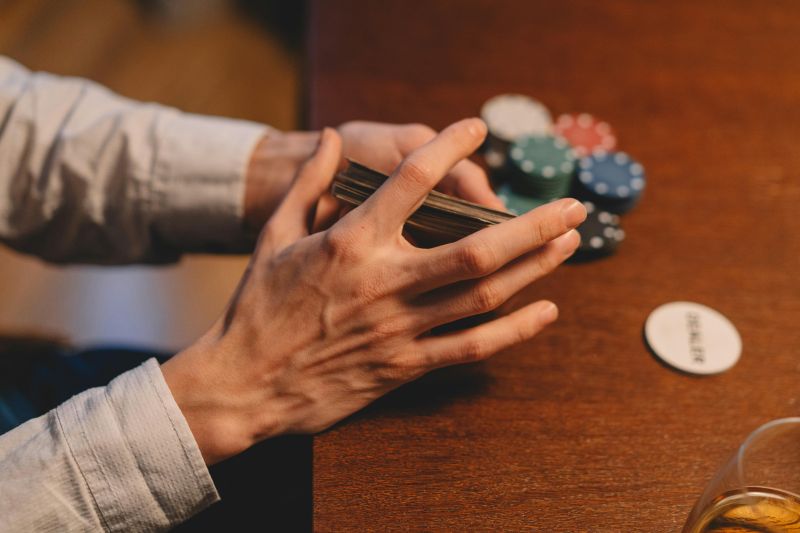
One of the most crucial elements of playing poker is placing a wager. When playing this game, the amount and frequency of your bets can reveal a lot about your playing style. There are other instances in which it is preferable to check rather than wager.
Being able to wager wisely has never been more crucial because only one out of every four poker hands makes it to the showdown. That said, we outline the poker betting rules you must adhere to, how to bet in poker, and whether to check or fold are all covered in the sections below.
Know Your Betting Choices
There are just five possible outcomes when playing poker. Learn about them so you can consistently make the best choice at the appropriate moment. The appropriate times to:
- Check - Stay in the game without placing a wager as long as no one else does.
- Fold - Turn down the opportunity to play the hand further and any cash you have contributed to the pot.
- Bet - The betting begins when someone places their initial bet. The remaining players then have to choose whether to call, fold, or raise.
- Call - To stay in the game when someone places a wager, you must at least equal it.
- Raise - You have two options when someone at the table bets: you can call or "re-raise," which will boost the pot. The next move for that player is to fold, call, or increase your wager.
Calling V.S. Betting
In poker, betting refers to any action that involves placing chips into the pot, including raising, opening the betting, and calling other bets. However, there is a significant distinction between calling and elevating.
You are not exerting any pressure on your competitor when you call an existing bet. Keep in mind that when someone bets and everyone else folds, they win three-fourths of all hands. Simply because you called their bet, nobody folded. When you play aggressively, either by placing the first bet or increasing an already placed stake, you are putting pressure on your opponent to respond and giving yourself a chance to take the pot before the showdown.
Know Your Opponent
Setting your betting strategy requires considering the respective playing skills of your rivals. If you find yourself up against multiple newbies, it is likely a good idea to shelve any bluffing strategies because it is far simpler to bluff a competent player than it is a bad player.
Instead, you should bet continuously against these players because they won't fold anytime they obtain a pocket pair or connect with the flop. If you believe you have the best hand, maintain the pressure on these guys all the way to the river. They'll phone you much after they need to stop, giving you a hefty payoff.
Control Your Table Image
The efficiency of your betting will also be influenced by the appearance of the table. Expect to see a lot more players eager to either call your stake or re-raise you if you are a loose player who nearly always places a continuous bet after the flop and almost always sees every flop.
Moreover, expect clever players to bet into you more frequently if you are a tight player who frequently folds to bets and re-raises. When you have a really powerful hand, of course, this could work in your favor, but it will also make you make a lot of decisions and make connecting with the flop more crucial.
Although this approach will make other players more respectful of your raises, you might have trouble creating sizable pots as a result of players folding to your bets.
Betting As A Bluff
The best cards won't always be enough to win. That is why it is so crucial to acquire bluffing skills. There are a few guidelines to follow while placing a bluff wager:
Recognize the vulnerable situations for your opponents. They'll be more open to a bluff as a result. Find any indications of weakness and move on.
Play board games confidently. With K-Q suited and a pre-flop bet, you might have utterly blown it on the A-7-5 flop. But if you make a continuation bet after your opponents assume you have a solid hand, you might scare them away, including skilled players holding middle pocket pairs.
Avoid trying to bluff excessively in the early stages of multi-table tournaments when the blinds are low and the pots are typically low as well. Ramp up your chip stack early on in the tournament so you can manage to try your hand at a few bluffs later on.
Final Thoughts
You can tell the other participants at the table the overall strength of your hand by the way you wager. At least that is what you wish your opponents to think when you make a big, decisive bet. It shows that you have a strong hand. When it is your turn to play, be prepared to make a prompt statement and toss the chips into the pot in one tidy motion.
Furthermore, weakness is demonstrated by calling or checking, hesitancy, fumbling with chips, indecision, and repeatedly checking your cards. Because of this, it is crucial to establish a plan and carry it out as quickly as it is your moment to execute.




















.jpg?v=1.014689161)



.png?v=1.014689161)

















